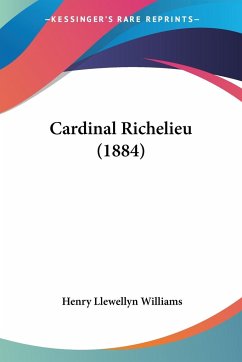
Red Robe And Grey Robe
Or Richelieu Defied (1901)
Versandkostenfrei!
Versandfertig in 1-2 Wochen
43,99 €
inkl. MwSt.

PAYBACK Punkte
22 °P sammeln!
Red Robe and Grey Robe: Or Richelieu Defied is a historical novel written by the renowned French author Victor Hugo in 1901. The book is set in 17th century France and follows the story of two young men, one wearing a red robe and the other a grey robe, who are caught up in the political turmoil of the time.The red robe represents Cardinal Richelieu, the powerful chief minister of King Louis XIII, while the grey robe represents the Duke of Buckingham, an English nobleman who has come to France to aid the Huguenots in their struggle against Catholic oppression.As the story unfolds, the two youn...
Red Robe and Grey Robe: Or Richelieu Defied is a historical novel written by the renowned French author Victor Hugo in 1901. The book is set in 17th century France and follows the story of two young men, one wearing a red robe and the other a grey robe, who are caught up in the political turmoil of the time.The red robe represents Cardinal Richelieu, the powerful chief minister of King Louis XIII, while the grey robe represents the Duke of Buckingham, an English nobleman who has come to France to aid the Huguenots in their struggle against Catholic oppression.As the story unfolds, the two young men find themselves on opposite sides of the conflict, with the red robe working to maintain the status quo and the grey robe fighting for change and freedom. Along the way, they encounter a cast of colorful characters, including a beautiful young woman and a mysterious stranger who may hold the key to their ultimate fate.Throughout the book, Hugo weaves a complex web of political intrigue, personal drama, and historical detail, creating a rich and engaging portrait of a pivotal period in French history. With its vivid characters, suspenseful plot, and powerful themes of loyalty, honor, and freedom, Red Robe and Grey Robe: Or Richelieu Defied remains a classic of historical fiction and a must-read for anyone interested in the history of France or the works of Victor Hugo.This scarce antiquarian book is a facsimile reprint of the old original and may contain some imperfections such as library marks and notations. Because we believe this work is culturally important, we have made it available as part of our commitment for protecting, preserving, and promoting the world's literature in affordable, high quality, modern editions, that are true to their original work.












